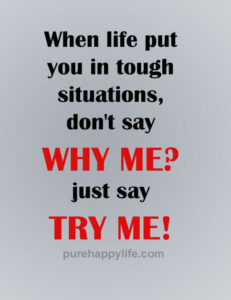Objectives:
- Skillfully navigating adversity is at the core of living a successful life.
- It is easy to become frustrated when things don’t go the way you think they should. Unfortunately, life is challenging and unpredictable, and efforts to make it otherwise consume energy and are counterproductive.
- Learning skills to process challenges is much more effective than trying to control them or avoid them.
- So, “failing” is part of life except it isn’t failing. If your expectation is to never feel mental or physical pain, you’ll be endlessly disappointed, which BTW, causes more inflammation that increases the pain.
- The focus is on learning tools to process stress rather than to avoid it. You’ll have more energy to move forward with or without your pain.
None of us like experiencing pain and most people have a deep desire to permanently eliminate it. But life keeps coming at us and this is not a realistic wish. So, why do we keep trying?
Suffering
Many of the problems perpetuating chronic pain arise from the understandable secondary anger and frustration around having to deal with adversity of any kind – especially pain. This is the suffering aspect of pain. It stimulates your immune system, inflammation increases, nerve conduction speeds up, your brain is sensitized, and you will physically feel more pain.
But you have a choice about suffering. What is your response to adversity – mental or physical? If you choose to rail about the injustices of life, you will dive even deeper into The Abyss. What you do have a say in is learning methods to process and lower your body’s neurochemical reaction to stress.

Good news or bad news?
Patients frequently returned to my office excited about their early improvement of pain. Some even broke free within weeks, after suffering years of misery. The positive energy emanating from them was palpable and inspiring.
I was energized by their stories, but often some of my first words were, “I am sorry to be the bearer of bad news, but you will continue to experience more pain, and maybe as severe as it was. These pain circuits are permanent. However, don’t despair!” My strong observation was that once your brain has experienced a more enjoyable state of being, you can find your way back.
The key is practice, practice, practice. As you become more skillful at pulling yourself back out of your pain state, you’ll dive into The Abyss less often and remain in for shorter periods of time. Pain will assume a more normal role in your life and will no longer be the center. Paradoxically, is that by understanding the inevitability of pain, you will experience less of it.
Why Me?
One way we deal with adversity is to control people and situations and take fewer risks. It makes more sense than seeking out or creating problems. However, the result is that your world will become progressively smaller. You cannot control most of your stressors, and you certainly can’t outrun your mind. Paradoxically, your stress will increase as you try to avoid it.

It is more rational to accept that what we term adversity is simply life. We all die and most of us will experience major illnesses and losses along the way. There are infinite number of wrongs, small and large, that happen to us personally, as well as on a global scale. Why would you be an exception?
Moving on
To be successful in any endeavor requires taking risks and dealing with the accompanying fears. If you are not willing to deal with those feelings, then it is probably not worth taking the risk. There’s a reason we say, “If you can’t take the heat then get out of the kitchen.” But by deciding to move forward, you have also lost the right to complain.
When you “fail,” you are welcome to take some time to wallow in your feelings. It is critical not to suppress negative thoughts and emotions, but it is also important to recognize what you are doing to yourself. At some point, you must let go, get back up, and move on. “It doesn’t matter how many times you fall; it is the number of times you get up.”
Resilience
When a bamboo grove is buffeted by a storm with high winds, the grove bends and then stands back up when it is calm.
It is not helpful for you to fight a sustained battle against overwhelming circumstances. When you are down, you are down. It’s important to be okay with it, rather than being self-critical for being triggered. No one is asking you to be happy when your situation is unpleasant. But you also do not have to keep beating yourself up.

The DOC Journey provides ways of establishing a deep connection with your immediate surroundings regardless of whether they are pleasant or not. This includes awareness of your self-judgement about “failing”.
Life is challenging. Take it in, let go and live.
Recap
Success is a story – and so is failure. Who is defining either one? You are and where did this judgment originate? Your current moment is determined by the entirety of your life. No two people are close to being alike and the definitions are arbitrary. It was Elanor Roosevelt who said that the only person who allows yourself to be hurt is you.
It is easy to become an “emotional perfectionist.” We resist our pain, which directs more neurological attention to it. By understanding that the ups and downs are inevitable, their impact will diminish. Learning to “fail” will allow you to have a higher chance of succeeding.
Questions and Considerations
- What is your relationship to adversity? Do you welcome it, deal with it, suppress it, or fight it?
- How do you feel when your reactions to stress are not as enlightened as you feel they should be?
- How much energy to you spend wishing that life was easier than it is?
- Would be your reaction to stress be more in the category of being tough, resilient, or at its mercy?
- Do you consider the risk/ benefit ratio before taking on a new project?
